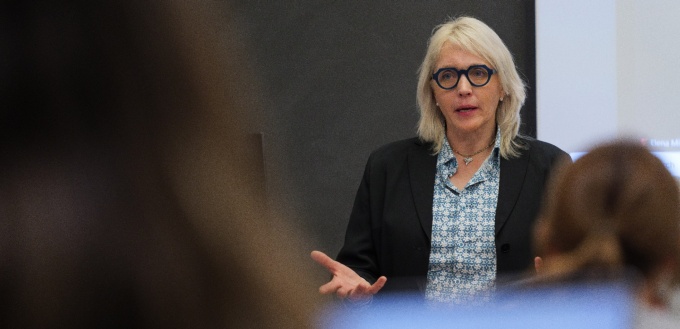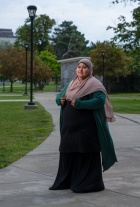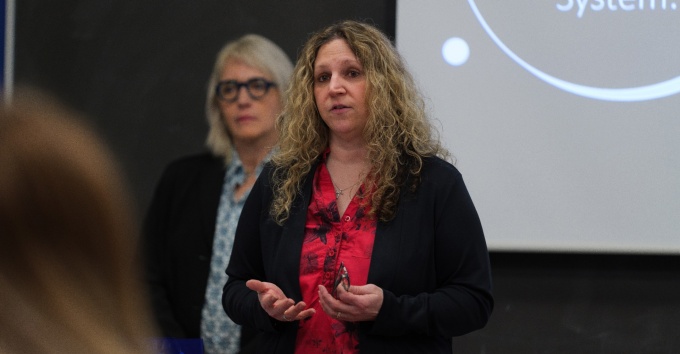Forensic Social Work
Advocating within the legal system

By Devon Dams-O'Connor
Thanks to popular TV shows like “CSI Miami” and “Law & Order,” the word “forensic” comes with a case file of connotations — swabbing for DNA, waiting for laboratory analysis, looking for rock-solid evidence that would hold up in court.
However, the term “forensic” has two definitions. The first, “relating to the application of scientific methods and techniques to the investigation of a crime,” is the more widely understood stuff of crime dramas. The second, “relating to the courts of law,” is where the field of forensic social work is rooted.
Forensic social work is social work that happens in the context of the legal and justice systems, including criminal and civil courts, child custody issues and mandated treatment.
Adjunct instructor Lynda Battaglia, LCSW, MSW ’01, offers an elective course in the UB School of Social Work that introduces students to the field.
In her class, Battaglia gives students a broad overview of how the justice system interacts with other structures and policies to affect social workers and the diverse populations they serve. She covers recent trends in the criminal justice system, including mass incarceration, civil commitment, the criminalization of poverty and the implications of the “war on drugs.” A big focus of class discussion is the disproportionate impact of these trends on marginalized communities within the United States.
“Forensic social work is broad, and it’s a specialty,” explains Battaglia. “We all follow the code of ethics and well-being, work on policy and social reform and advocate for rights. We do that even more in forensic social work, where those ethics intersect with criminal justice and the courts. I invite students to come to class with a wide lens to capture all the aspects — race and poverty, victims and survivors, forensic hospitals and so much more.”
Given the myriad career paths forensic social workers can select, Battaglia frequently invites alumni and colleagues who practice in a variety of settings to speak to her class, connecting classroom discussions with direct experiences on the front lines.
Mediation and entrepreneurship

Jeanne Kratt speaks during Battaglia's class. Photo: Andrew Griesmann.
One alumni speaker in Battaglia’s class is Jeanne Kratt, MSW ’11, who has been a social worker for more than 25 years. She facilitates supervised visitation through family court, working with parents, grandparents or guardians to stay connected with their children while separated by a court order.
In 2022, she started her own business, Family Matters & Investigations LLC, which brings families together through monitored visits and mediation. As a sole practitioner, Kratt can facilitate get-togethers in a broader variety of settings than agencies allow, like mini-golf outings, concerts, libraries — places that allow for more comfortable, organic interaction between family members.
In mediation, for example, Kratt works with family members to reach an agreement on their elderly parent’s care plan or to settle an estate, or with parents to make changes to custody and access schedules.
She also offers Child Inclusive Mediation, a newer approach that invites a child’s perspective to be expressed within the context of mediation to ensure they have a role in their care and visitation. It’s a service Kratt wishes more families sought out.
“We have a lot of work to do on getting the word out about mediation — the opportunity to talk to resolve differences rather than going to court,” says Kratt. “A lot of people have no idea this is an option.”
Corrections-based care

Christina Boccio.
Another guest speaker is Battaglia’s former student Christina Boccio, LCSW, MSW ’20, a social worker with the Central New York Psychiatric Center’s corrections-based operations. She works in Attica Correctional Facility’s mental health unit with incarcerated individuals with severe mental illness, providing one-on-one support and group programming.
Coming from a family of attorneys, Boccio was interested in a career that involved law — but not law school. An undergraduate sociology course held at Riker’s Island Correctional Facility opened her eyes to the forensic side of her social work minor, so Boccio decided to pursue an MSW to give her the most flexibility.
“Social work had the option of directly working with people,” Boccio explains. “Attorneys aren’t always doing the deep dive with people to understand them. I was more interested in being on the front line and providing direct service. The MSW gave me a lot of options – direct services or macro level in education or policy. The underlying niche for forensics and the law was intriguing.”
Advocating for victims of domestic violence

Halimah McBryde
Halimah McBryde, MSW ’23, was also one of Battaglia’s students. She is a counselor at Crisis Services and a clinical advocate at Resources and Help Against Marital Abuse (RAHAMA), specializing in serving Muslims, immigrants and refugees.
Her clients, mostly women, are often in domestic violence situations where the abuser uses victims’ legal status, cultural expectations or lack of knowledge about the U.S. legal system as a means of control. McBryde helps her clients get orders of protection, file police reports and go to court to retain custody of their children — all rights people have regardless of citizenship. She also does a lot of outreach with law enforcement.
“In DV work, we use police services a lot, like escorts to go get items from a home or respond to incidents,” McBryde explains. “We need to have a good relationship with the police to make sure they know what we do and can respond appropriately, like sending a female officer to take the report. A lot of the outreach is designed to dispel stereotypes around Muslim women to clarify what the religion teaches, what individuals’ rights are religiously and legally.”
Skills and interests suited to this career path

Lynda Battaglia addresses her students. Photo: Andrew Griesmann.
Success as a forensic social worker takes patience, resourcefulness, strong personal boundaries, and above all else, empathy.
“Those who do better are those who want to listen and not form opinions,” says Kratt. “You can’t assume you know what someone is thinking or feeling.”
An interest in the legal system is key, too. While forensic social workers don’t typically study law in school, they become adept at the rules, laws, processes and systems that impact their work and their clients through training and experience on the job.
Forensic social workers often collaborate with other professionals who work in a particular system, including psychiatrists, nurses, attorneys, corrections officers, police and court personnel. Establishing rapport and understanding each professional’s distinct role is key to working effectively for their clients.
“Systems recognize the need for this field because forensic social workers understand the overlapping disciplines, the courts and the language, and they bring advocacy to the system,” explains Battaglia. “With the social climate we’re in today, mental health is at the forefront of everything — social justice, race, poverty, interactions with law enforcement and the courts. Social workers are in the middle of all that and always have been. We’re in high demand right now.”
Published May 7, 2024
